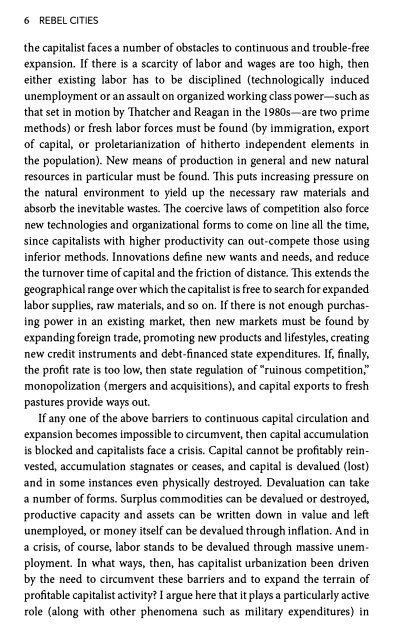Rebel Cities-David Harvey
Rebel Cities-David Harvey
Rebel Cities-David Harvey
- No tags were found...
You also want an ePaper? Increase the reach of your titles
YUMPU automatically turns print PDFs into web optimized ePapers that Google loves.
6 REBEL CITIESthe capitalist faces a number of obstacles to continuous and trouble-freeexpansion. If there is a scarcity of labor and wages are too high, theneither existing labor has to be disciplined (technologically inducedunemployment or an assault on organized working class power-such asthat set in motion by Thatcher and Reagan in the 1980s-are two primemethods) or fresh labor forces must be found (by immigration, exportof capital, or proletarianization of hitherto independent elements inthe population). New means of production in general and new naturalresources in particular must be found. This puts increasing pressure onthe natural environment to yield up the necessary raw materials andabsorb the inevitable wastes. The coercive laws of competition also forcenew technologies and organizational forms to come on line all the time,since capitalists with higher productivity can out-compete those usinginferior methods. Innovations define new wants and needs, and reducethe turnover time of capital and the friction of distance. This extends thegeographical range over which the capitalist is free to search for expandedlabor supplies, raw materials, and so on. If there is not enough purchasingpower in an existing market, then new markets must be found byexpanding foreign trade, promoting new products and lifestyles, creatingnew credit instruments and debt-financed state expenditures. If, finally,the profit rate is too low, then state regulation of "ruinous competition;'monopolization (mergers and acquisitions), and capital exports to freshpastures provide ways out.If any one of the above barriers to continuous capital circulation andexpansion becomes impossible to circumvent, then capital accumulationis blocked and capitalists face a crisis. Capital cannot be profitably reinvested,accumulation stagnates or ceases, and capital is devalued (lost)and in some instances even physically destroyed. Devaluation can takea number of forms. Surplus commodities can be devalued or destroyed,productive capacity and assets can be written down in value and leftunemployed, or money itself can be devalued through inflation. And ina crisis, of course, labor stands to be devalued through massive unemployment.In what ways, then, has capitalist urbanization been drivenby the need to circumvent these barriers and to expand the terrain ofprofitable capitalist activity? I argue here that it plays a particularly activerole (along with other phenomena such as military expenditures) in


